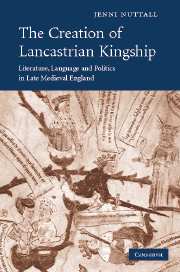Introduction
Published online by Cambridge University Press: 27 October 2009
Summary
‘Politics is very largely the use of language.’ This is as true for England in the later Middle Ages as it is in the twenty-first-century world of spin doctors and sound bites. Language does not simply provide the means by which political actions are carried out, but also shapes the form of politics itself. Following decisive and unforgettable turmoil, the language of political debate changes in ways which then influence subsequent action. Political upheaval creates memorable discourses which are kept in mind and frequently returned to in the months and years following the initial moment of crisis. One such indelible event was the deposition of Richard II by Henry Bolingbroke in the summer and autumn of 1399. Henry, whom Richard had exiled in September 1398, returned to England in July 1399 to reclaim the inheritance withheld from him following the death of his father, John of Gaunt. Very soon after his landing, however, Henry's ambitions grew from the recovery of his inheritance to the English throne itself. By the middle of August, Richard had fallen into Henry's hands and the process of securing the usurpation had begun. Once Richard was in custody and those remaining loyal to him had been overcome, Henry and his supporters set about formulating words and ideas to explain and justify recent events, to convert their illegal usurpation into a legitimate deposition.
- Type
- Chapter
- Information
- The Creation of Lancastrian KingshipLiterature, Language and Politics in Late Medieval England, pp. 1 - 6Publisher: Cambridge University PressPrint publication year: 2007

